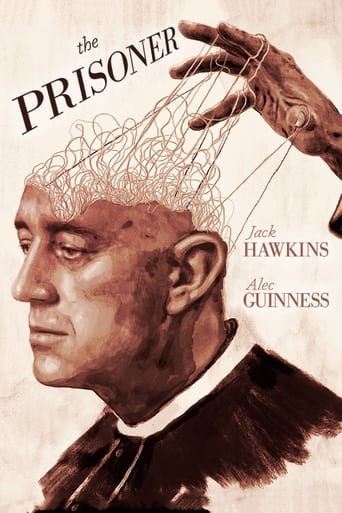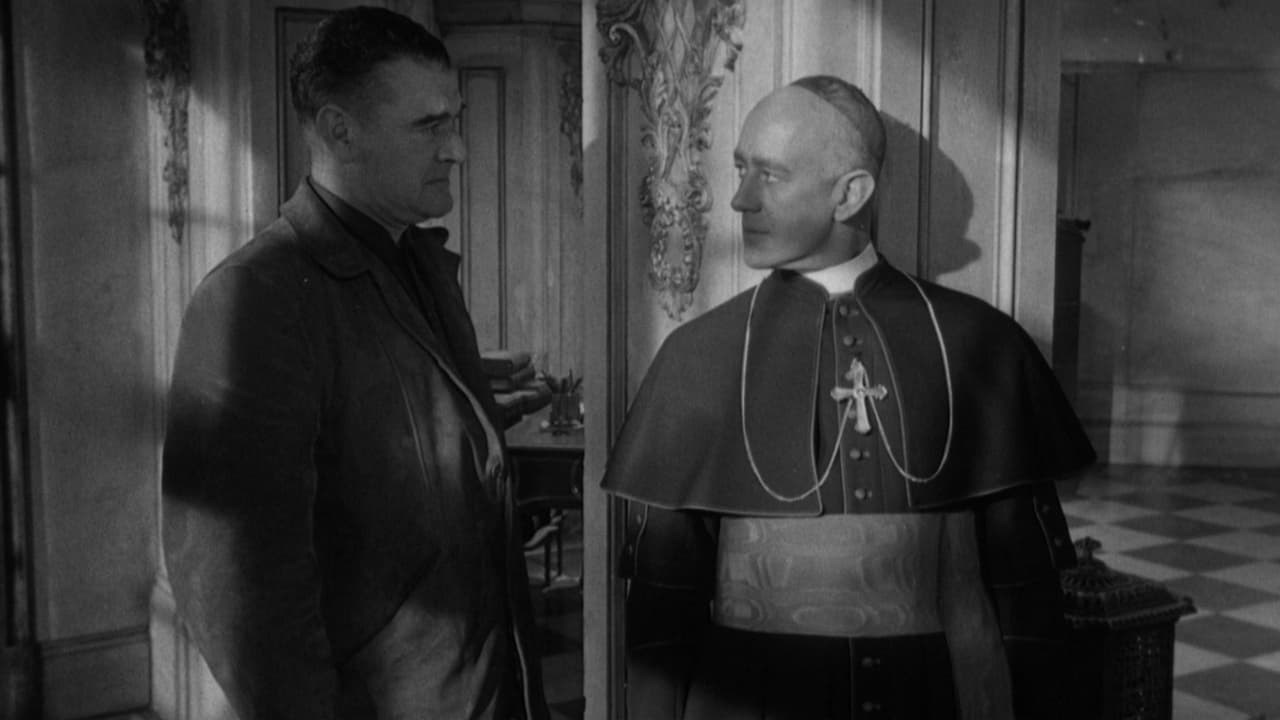clanciai
Interesting play by Bridget Boland loosely based on the notorious fake trial of Cardinal Mindszenty of Hungary after a month of brainwashing by the communists in 1948. Alec Guinness was himself a catholic and is really living out his catholicism in this great performance of the live dissection of a catholic priest, extremely actual in today's situation with the church immersed in scandals of pedophilia. Bridget Boland makes a very different story from the Mindszenty drama, making the interrogator (Jack Hawkins) an equal to the Cardinal as opponent and prosecutor and seems to be winning but actually loses in the end against the honesty of the Cardinal realizing his own futility, while the prosecutor- interrogator as a victor is the real loser and takes the consequences. Fascinating drama, which should be returned to again and again. In reality, Cardinal Mindszenty's brainwash process only lasted for less than a month and was chiefly conducted by the use of drugs and physical exhaustion. The only parallel torture that Alec Guinness is exposed to is forced insomnia. He is imprisoned for longer than three months with only private talks with the interrogator as a method and finally released, when the "state" thinks it has won by ruining his reputation and exposing him as a fraud, while Cardinal Mindszenty was sentenced for life. The film was made in 1955, the year after saw the Hungarian revolt, and Cardinal Mindszenty was then set free and lived a long life, even writing books and his memoirs. He is still one of the most important icons of Hungary and will remain so. His shrine is at the ancient basilica of Esztergom north of Budapest, a very beautiful place by the Danube.
Bill Slocum
Even for a jailroom drama with a closed-in set and a minimum of exposition, "The Prisoner" is one clenched movie.In an unnamed city in an unnamed country, an unnamed cardinal (Alec Guinness) is interrogated for crimes against the state. His unnamed interrogator (Jack Hawkins) sets the case for the audience in unusually stark terms."You represent a religion which provides an organization outside the state," he says.The cardinal states his position as boldly: "I am difficult to trap and impossible to persuade. I am tenacious, wary, and proud."Obviously based on the repression of Catholic leaders in Eastern Europe after World War II, "The Prisoner" suffers from the sin of its obviousness. Everything about this film seems designed to fit into the right round holes. There's a jokey jailer, an overbearing functionary, even a shoehorned romantic subplot.At one point, we see a young man writing the words "Free Beliefs Free Speech" on a wall. I guess he was too preoccupied to share what those beliefs might be. No matter; before he finishes a policeman walks up and shoots him, I guess because it is more symbolic than arresting him.The stand-off between Guinness and Hawkins is just as tightly regimented, with obvious bits of symbolism designed to make a case any sentient being has picked up on five minutes in. The Interrogator doodles a spider web during his questioning of the Cardinal. The Interrogator plays chess before we cut to the Cardinal walking across flagstones. "God give me cunning against your skill" and "You've defeated me" are actual lines in the movie. The movie doesn't end as one might expect; it avoids this trap with a finale that doesn't make any sense at all.Apparently all this struck some people as controversial back in 1955, as "The Prisoner" was banned from a couple of major film festivals. If it was released today, it would be easier to understand the hostility, even if the role of faith in this film is muted to the point of insignificance.Given the historical and personal background of this project, so close to the heart of Guinness who would convert to Catholicism a year after this movie, it is surprising to see Sir Alec playing the part so awfully. He's a serene statue through the first half, and then a shrieking shamble in the second, even beating his head with his fists.The only plus in the film is Wilfred Lawson's crusty jailer, called "Waldo" in the subtitles though I think that's someone mishearing "Warden." He has a couple of nice speeches, including one when he remembers a boyhood cuckoo clock with a juicy chuckle. The bits we get of Lawson show director Peter Glenville had the good sense to give room to at least some of his actors. But the Warden's a minor figure in a film that doesn't do anything worthwhile with anyone else.
oscar-35
Spoiler/plot- 1955, The Prisoner, An outspoken Cardinal from Eastern European country is jailed for his rebellious beliefs and subject to relentless interrogation of a psychologist in prison. Hoping for a phony confession that would create chaos among the countries large Catholic population, the interrogator knows no amount of brutal torture will sway his prison subject that fought the Nazi Gestapo. But after months of hard mental torture, the interrogator finds a crack in his subject's facade when the interrogator challenges his religious ideals in a gripping prison scene. The film ending is quite a enjoyable twist.*Special Stars- Sir Alec Guiness plays the lead, as The Cardinal. Jack Hawkins plays the interrogator.*Theme- Totalitarian governments break-down the individual, while religion glorifies it.*Based on- Eastern European world news headlines.*Trivia/location/goofs- An English film shot a the Pinewood Studios. Such a controversial film that it was BANNED at Cannes & Venice Film festivals for it's political implications on Eastern BLOC countries. A memorable line is given by Guiness just before his Cardinal role is jailed, "Any confession coming from me in prison is a lie or completely due to the weakness of man". 'The Motion Picture Guide' rates this film highly and rates the performances by the two male leads as "...two best roles and performed at their very best." *Emotion- A very excellent dramatic and tension filled film plot with meaty roles for these two giants of the British screen. While these two stars were in the same film, seldom have they shared scenes acting off each other like in this film. A true delight to enjoy watching these solid film stars in the beauty of black-and-white. The film's subject matter is thought provoking for spiritual and non-spiritual people alike.
MARIO GAUCI
Inspired by the plight of Catholic Cardinal Josef Mindszenty behind the Iron Curtain – already the subject of a worthwhile low-budget Hollywood film, GUILTY OF TREASON (1950; see above) – this prestigious British production (based on a Bridget Boland play, who adapts her own work for the screen) boasts two powerhouse performances by Alec Guinness (as the proud Prince of the Church) and Jack Hawkins (as the wily Interrogator). Their interaction is a beauty to behold and one cannot help but be reminded how these formidable actors had already worked together in, curiously enough, MALTA STORY (1953) and, of course, would go on to do so again under David Lean's Oscar-winning direction in THE BRIDGE ON THE RIVER KWAI (1957) and LAWRENCE OF ARABIA (1962). Although much of the running time is devoted to their rigorous one-on-one sessions (enough for it to be deemed a two-hander), the film allows (at least) another fine actor to shine: Wilfred Lawson as Guinness' jailer who grows to respect his prisoner with time. The small cast also includes Kenneth Griffith as Hawkins' eager-to-learn subordinate – incidentally, the latter also appeared in two episodes of Patrick McGoohan's later cult TV series of the same name but which bore no relation to this movie! – and Raymond Huntley as Hawkins' impatient superior. Conversely, the romantic subplot between doubting Communist Ronald Lewis and his Catholic girlfriend Jeanette Sterke seems forced and intrusive – almost like an afterthought (whereas it had been far more effectively handled in the aforementioned Hollywood treatment). But, as I said before, the film's trump card is its gradual depiction of the evolving relationship between the two leads, which really has no equivalent in GUILTY OF TREASON (where Charles Bickford's tormentors were various and generally shrouded in darkness). Although the main characters and the setting remain unnamed throughout (lending it a pretentious air of political allegory also missing from the earlier film), the controversial subject of THE PRISONER got it banned from participating in both the Cannes and Venice Film Festivals – although it did get nominated for 5 BAFTAs and, eventually, won a couple of other international awards.



 AD
AD


